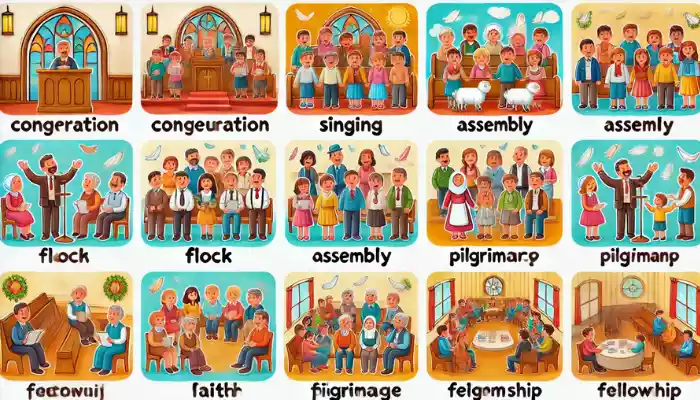Collective nouns are special words used to describe a group of people, animals, or things. They make our language colorful and fun! Today, we will explore the collective nouns used for groups of believers. Believers can be people who have faith in a particular religion, cause, or philosophy. Let us dive into these interesting collective nouns.
Table of Collective Noun for Believers
| Noun | Collective Noun | Definition | Example |
|---|---|---|---|
| Believers | Congregation | A group of people gathered for religious worship | The congregation sang hymns together. |
| Believers | Flock | A group of people who follow a particular religion or leader | The flock listened intently to the pastor. |
| Believers | Assembly | A group of people gathered for a common purpose | The assembly gathered for the evening service. |
| Believers | Faithful | People who remain loyal to a cause or religion | The faithful gathered for the annual pilgrimage. |
| Believers | Fellowship | A group of people sharing a common faith | The fellowship met weekly to discuss scriptures. |
Detailed Explanations and Examples for Believers
1. Congregation
A congregation refers to a group of people who come together for religious worship or gatherings.
Examples:
- The congregation filled the church on Sunday morning.
- The pastor greeted the congregation with a warm smile.
- During the holiday service, the congregation sang traditional songs.
2. Flock
A flock is used to describe a group of people who follow a particular religion or leader.
Examples:
- The flock gathered around their leader for guidance.
- She led her flock with kindness and wisdom.
- The flock met every week to discuss their beliefs.
3. Assembly
An assembly is a group of people who gather for a common purpose, often related to religious or social matters.
Examples:
- The assembly met to discuss the upcoming charity event.
- During the assembly, various speakers shared their experiences.
- The assembly came together to celebrate their faith.
4. Faithful
The faithful are people who remain loyal to a cause or religion, often demonstrating strong belief and dedication.
Examples:
- The faithful attended the service despite the heavy rain.
- Every year, the faithful participate in the sacred rituals.
- The faithful showed unwavering support for their community.
5. Fellowship
A fellowship is a group of people sharing a common faith or interest, often meeting regularly to support one another.
Examples:
- The fellowship organized a picnic for all its members.
- During the fellowship meeting, they discussed their spiritual journeys.
- The fellowship provided a sense of belonging and support.
Quiz Time
1. What is the collective noun for a group of people gathered for religious worship?
- A) Flock
- B) Congregation
- C) Assembly
2. Which collective noun describes a group of people who remain loyal to a cause or religion?
- A) Faithful
- B) Fellowship
- C) Congregation
3. What collective noun would you use for a group of people sharing a common faith?
- A) Assembly
- B) Congregation
- C) Fellowship
4. What is the collective noun for a group of people who follow a particular religion or leader?
- A) Faithful
- B) Flock
- C) Fellowship
5. Which collective noun describes a group of people gathered for a common purpose?
- A) Assembly
- B) Congregation
- C) Faithful
Quiz Answers
- B) Congregation
- A) Faithful
- C) Fellowship
- B) Flock
- A) Assembly
Conclusion
Collective nouns make our language vivid and expressive. Knowing the right collective noun for a group of believers can help us communicate more clearly and effectively. Whether it’s a congregation, flock, assembly, faithful, or fellowship, each term adds a unique touch to our descriptions. Keep exploring the wonderful world of collective nouns and have fun learning.

